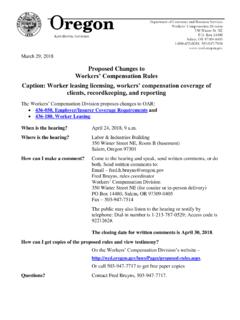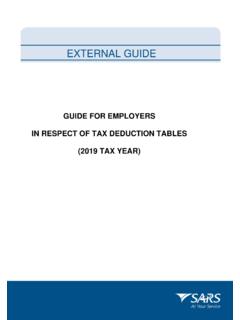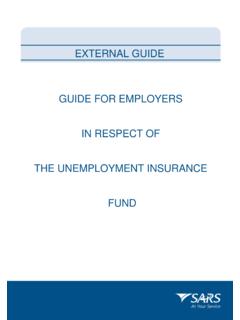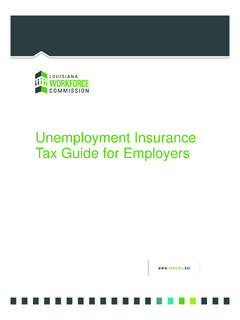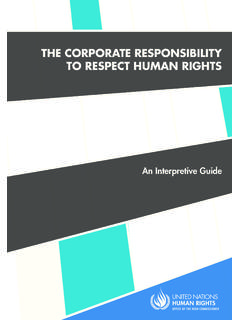Transcription of Why do I need - wcd.oregon.gov
1 A guide for Oregon employersWhy do I needworkers compensation insurance?In compliance with the Americans with Disabilities Act (ADA), this publication is available in alternative formats. Call the Workers Compensation Division, contained in this publication are in the public domain and may be copied and distributed without permission from the Workers Compensation of ContentsIntroduction ..2 Why is there workers compensation insurance? ..2 Workers compensation: employer information ..4 Who needs it? ..4Am I an employer? ..4 Are my employees exempt? ..5 How do I get workers compensation coverage? ..9 The insurance policy ..9 Oregon proof-of-coverage filing ..10 Worker leasing ..11 Temporary staffing ..11 What if I do not comply?
2 12 Frequently asked questions ..15An ounce of prevention ..21 Whom do I call? ..23 Services directory ..272 IntroductionWhy is there workers compensation insurance?Workers compensation insurance is good for workers and good for business. You know it is in the best interest of your employees. If they get hurt, it provides them with medical treatment, payment for time loss and disability, and even re-employment assistance if they need it. But did you know that workers compensation was created to protect employers, too?There was a time when workers who were hurt on the job often had to sue their employers to get help with their expenses. To the worker, this meant either no benefits or a long delay. To the employer, it meant possible financial ruin if the worker won a large award in compensation insurance was the answer to both problems.
3 It replaced legal liability with no-fault insurance. Employees with injuries or diseases caused by work could quickly get treatment, with no need to prove the employer at fault. Employers were protected from lawsuits. Benefits were for actual loss and did not add large sums intended to punish the employer or pay for pain and suffering. As long as the injury or illness resulted from work, neither employer nor employee had to go to compensation: employer informationWho needs it?As with most no-fault insurance, workers compensation is fair only if it applies to all workers and employers. The State of Oregon requires almost all employers to carry workers compensation insurance on their employees. If you employ workers in Oregon, you probably need workers compensation coverage.
4 Ask yourself the following questions:Am I an employer?If you pay someone to work for you, and you are in charge of the way the job is done, that worker is probably your employee. If you are not in charge, the worker is usually called an independent contractor. However, the difference between an employee and an independent contractor is often 1989, the Oregon Legislature tried to end the confusion for several agencies by defining an independent contractor using a checklist of eight tests. However, workers compensation law does not specifically say an independent contractor is never an employee. In 1994, the Oregon Supreme 5 Court ruled that, for workers compensation purposes, the independent contractor checklist does not prove someone is or is not an , instead of using the independent contractor checklist to tell you if you need workers compensation insurance, you must go by general guidelines that have evolved in the courts.
5 The courts look at four main areas to decide if a worker is an employee:1. Do you actually control or have the right to direct the worker?2. How is the worker paid? By the hour? By the piece? On a commission? By the job?3. Who supplies the tools and equipment the worker needs to do the job?4. Do you have the right to fire the worker without breach of contract?These questions can t always be answered by a simple yes or no. For helpful information from all agencies, visit my employees exempt?Some workers do not have to be covered by workers compensation, even if they are employees. Here are some of the most common exceptions:Sole proprietors. If you are a sole proprietor, you do not need coverage on In landscape and building construction, exempt partners are limited to two, unless all partners are family members (related as parent, daughter, son, daughter-in-law, son-in-law, grandchild, spouse, or sibling).
6 In other industries, partners are not required to cover themselves. The partners must be real partners, though, with the right to make business residence workers. People working for you at your home. This includes workers doing cleaning, home health care, gardening, maintenance, and even remodeling. It does not include laborers performing landscape construction or constructing a new labor. If your total payroll is always less than $500 within any 30-day period, your workers are casual and don t have to be covered by workers compensation. However, if your payroll reaches $500 within any 30-day period, workers compensation is required from the earliest start date of your current you are in landscape or building construction, keep in mind that the Construction Contractors Board (CCB) and the Landscape Contractors Board (LCB) rules don t allow you to hire even casual labor while you are registered as not having corporate officers.
7 Corporate officers do not have to be covered by workers compensation if they also serve on the board of directors and own at least 10 percent 7of the stock (or an amount equal to the average amount held by all stockholders). Incorporated construction companies are limited to two exempt are exceptions to the ownership requirement of family-run farm and timber businesses. Landscaping and building construction companies are usually limited to two exempt officers; however, family-run landscaping and building construction companies may be allowed more exempt limited liability company members. Most members are exempt, even if the members do not have substantial ownership, except in the landscape and building construction trade.
8 In landscaping and building construction, all members are exempt if they are of the same family. Otherwise, exemptions in construction are limited to two members or one member per 10 employees, and the members must have substantial ownership interest in the sole proprietors, partnerships, corporations, or limited liability companies are working under a contract, they must also qualify as independent contractors to be exempt from workers compensation from out of state. Out-of-state employers temporarily working in Oregon are not required to obtain Oregon workers compensation insurance policies if all of the following are true:81. Their home-state policies cover the workers they bring into Oregon on temporary Their home state recognizes an Oregon employer s Oregon coverage while doing work on temporary assignments in that They do not use Oregon subject workers while they are in allows most employers and workers from other states to use their home-state coverage when they are temporarily working in Oregon.
9 This does not change the requirement that employers must obtain Oregon coverage for any Oregon subject workers. For more information, go to contracts are now handled the same as private contracts with respect to obligation for workers compensation in Oregon. Workers temporarily in Oregon are defined by nine criteria found in Oregon Administrative Rule do I get workers compensation coverage?The insurance policyIn Oregon, employers can obtain workers compensation coverage through an insurer, be certified as self-insured, or can make an arrangement for coverage through an Oregon-licensed worker leasing companies. You can get insurance from any insurer authorized to provide workers compensation in Oregon. There are more than 300 such companies registered to write workers compensation insurance in Oregon.
10 Many of these insurers sell policies through agents. Often, the agency that handles your other business insurance will also help you place your workers compensation insurance. Some insurers will deal directly with you, and a few have made special arrangements to provide workers compensation through business organizations or associations. The Department of Consumer and Business Services has an ombudsman who is an advocate for small business and is available to discuss options with you. Call 503-378-4209 for Assigned Risk Insurance Plan. If you cannot find an insurer willing to write your policy, you can get insurance through the Oregon Assigned Risk Insurance Plan. Oregon law requires workers compensation insurers to belong to an insurance plan for employers who can not get insurance on the open insurance plan is administered by the National Council on Compensation Insurance (NCCI).

